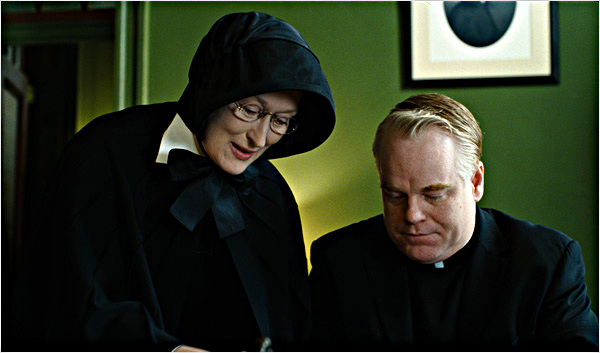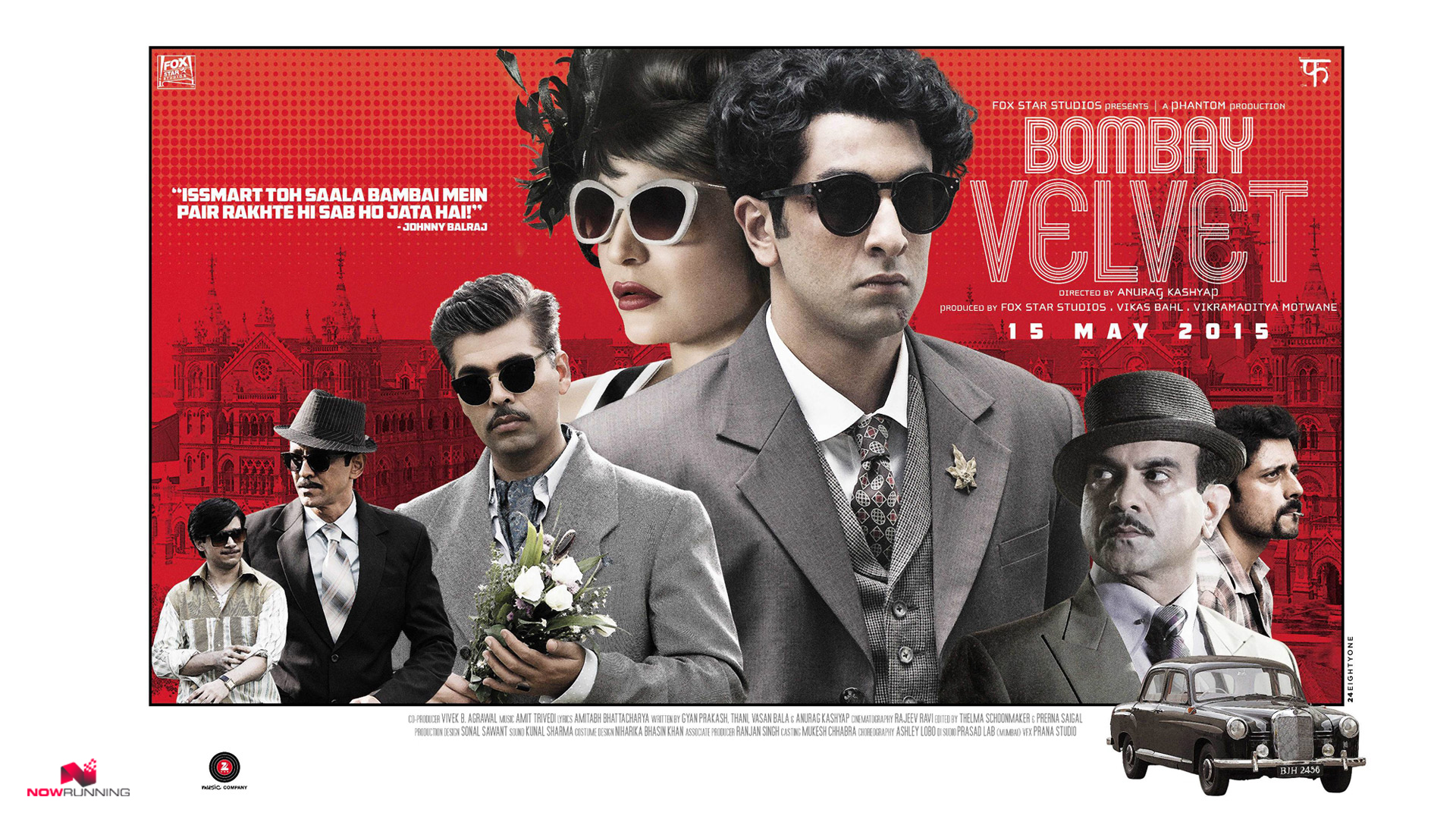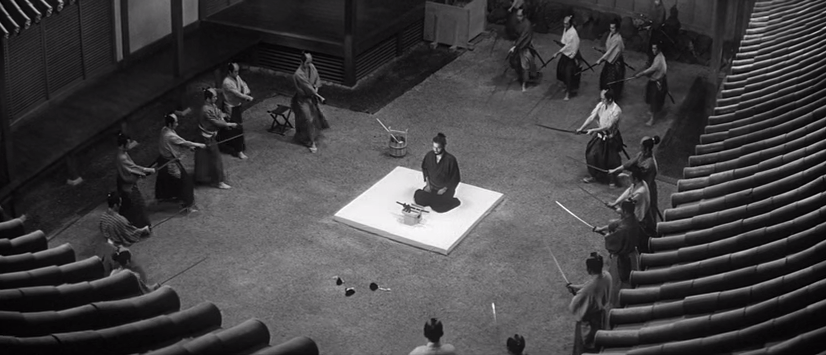Doubt
Doubt : Film Review
4 stars out of 5 (Excellent)
Director and Writer : John Patrick Shanley
English , 2008
The stage is a prestigious catholic school in Bronx,NY in 1964. Sister Aloysius Beauvier (Meryl Streep) is one of those teachers,in the memory of whom, pupils in later years might think with a wan smile "I probably needed that whip!". Ostensibly in her early sixties, she is a keen disciplinarian, religiously dedicated to rapping errant wards into line. A sense of humour is detectable in her words but it is tempered in the often cutting nature of her observations. Sister James (Amy Adams), a soft-demeanoured young woman, joins the school and the class duly proceeds to take raucous advantage of her libertarian attitude.
Sister Aloysius quickly brings her up to speed on the multifarious shenanigans of the conniving creatures they are tasked to deal with, and how to tame them. Dinner for the group of nuns in the church, presided over by Sister Aloysius is a suitably non-carnal affair, with a glass of milk by each plate to complete the ’honest to God’ goodness of it all. Silent solemnity prevails, as if to mourn the life of what has now ended up as their supper. The portly Father Brendan Flynn (Philip Semour Hoffman), in sharp contrast, is no martyr to the ’good life’. A scene with his like-minded colleagues shows them laughing, smoking, quaffing alcohol and digging into rare red meat. Apart from such duties, Father Flynn also teaches the niceties of basketball to the school-boys and assiduously jots down pearls of wisdom that sporadically dawn on him,so that they can be collated into a sparkling sermon,delivered from the puplit with a flourish.
The weather outside informs a lot of what is going to transpire indoors. It is autumn and cold. The first spark to warm and then heat up the proceedings is created when Sister Aloysius suspects Father Flynn of unholy private communion with an African-American boy who’s newly joined the school. But the easy solutions to problems she usually deals with, is in short supply in this case, as she discovers with an escalating sense of unease while attacking the case with unflinching audacity.
’Doubt’, well-written and consummately directed, both for the stage and cinema, by John Patrick Shanley, is an indubitably superior film - depending on and ably held up by crackling dramatic conflict and a plot that’s not anxious to lay bare the answer to to its mystery. At start of pic, Flynn has embarked on the delivery of an interestingly-themed sermon on how doubt, like faith, can go a long way in building up the ultimate perspective. Sister Aloysius, meanwhile, seems to have chewed and absorbed long ago any wisdom that the good Father might have to proffer to her. She quickly interprets the sermon in her own way, gets up and patrols the church aisle looking to deliver a square-cut on to the heads of mischievous pupils. Later when the matter of his alleged grave crime is hinted at, Flynn shows a state of almost uncomprehending surprise. But after understanding the case, he subsequently plots a sermon that neatly illustrates the irreversible consequences of what Aloysius may be guilty of. One of the fim’s last few moments of amusement ensue when Flynn sits down unsuspectingly to have a cup of tea during a meeting arranged by Sister Aloysius and Sister James, in the former's office. When he asks for sugar, a frantic search is commenced. Apparently such odd accoutrements like sugar have long become extinct in Sister Aloysius’s office. A further jolt to her sense of composure is given when the preferred amount of sugar ("depraved even in his palate!", she might sigh!) is specified. The film reaches its dramatic crescendo when both of them meet again to thrash out the issue in private. It is a powerful scene, of offence,defence,allegation and assertion.
The story-telling weaves ambivalent feelings towards Aloysius and Flynn. The latter would have cut a fine, interestingly alloyed figure of a likeable, Leftist priest were it not for what he is accused of. As for the former, despite her obstinate and flat refusal to consider an alternative perspective to the case at hand, she merits sympathy in the end not only for what she says, but also possibly for the fact that the system ultimately seems tacitly pitted against people like her.
The director is said to have informed only one of the protagonists about the actual "truth" of the matter at the start of shooting. In some films, much of the story-telling becomes redundant if the "real" facts relating to the suspense are revealed .But ’Doubt’ is not all about the destination, and for that matter the ending does not reveal a whole lot to the eternally objective morons who despise open endings. Shanley takes a lot of care to instil oodles of gravitas into individual segments of the narrative. One of the main reasons the film unfolds so well is the brilliant portrayal by the lead players. Meryl Streep’s act , to put it simply, is perfect. Her acting seems to have become even better with age. In a memorable,utterly natural style, she brings to sharp life the character of Sister Aloysius, the no-nonsense nun who comandeers her corps and squarely addresses any rot. Philip Seymour Hoffman provides an able foil by his strong nuanced essaying of Father Flynn. Hoffman’s beefy face nicely packs a wry smile or a smirk ; his corpulence suits roles where ulterior excesses are hinted at. And his physiognomy and personality lend themselves to protean roles - a crafty antagonist, a troubled soul, smug brick, an essentially good-natured fellow or a plain pervert among other qualities. Here his persona, in varying measures, incorporates all of those elements. And in the end, this character does more than enough to flummox any certain conclusions.
The pic’s palette has been designed by Roger Deakins ,who has a highly evolved gift for creating vistas that deeply suit and accentuate the given story’s soul. In what we see of this movie’s environment, the warmth has long since leached out, and there exists only the steady abscission of cheer. The film is based on a very popular play that won the 2005 Pulitzer prize, and in retrospect one better appreciates the stage origins of the story which remains rooted to a very circumscribed physical space in and around churchly precincts. Nonetheless, this celluloid rendition dons its cinematic garb in a way that is both taut and airy.
After watching some films (I’ll leave you, dear reader, to figure out the contenders), one wonders what relation the story has to the title. In this film’s case, there will be no such doubt.
UPN
UPNWORLD welcomes your comments.










0 COMMENTS
WRITE COMMENT